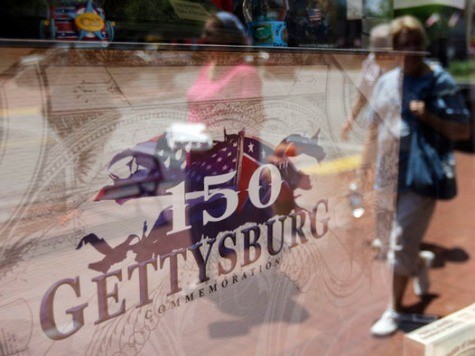President Barack Obama has elected not to attend the 150th anniversary of the Gettysburg Address on Tuesday, Nov. 19th. Instead, he will be meeting with Senators at the White House to persuade them not to impose new sanctions on Iran, and to convince them of the merits of an agreement that will allow Iran to continue to enrich uranium at low levels. No doubt, that is important–but it is also a revealing choice.
Lincoln’s speech is remembered because it expressed, simply and elegantly, why hundreds of thousands risked their lives for an idea: “that government of the people, by the people, for the people, shall not perish from the earth.” When President Obama sought to rouse Americans to support a “targeted military strike” on Syria, he failed to move the nation. Now, he prefers to counsel the nation to accept a weak compromise with tyranny.
The contrast is striking. Obama has repeatedly likened himself to Lincoln, launching his presidential campaign from the Old State House in Springfield. He cast his candidacy as the fulfillment of the promise Lincoln made at Gettsyburg–“that all men are created equal.” Like Lincoln, Obama came up through the Illinois legislature. Like Lincoln, Obama became known for his oratory. But Lincoln’s speeches had something Obama’s never will.
Lincoln’s speeches are admired not just because they are well-constructed, but because they contain timeless principles to which he devoted his career and to which he committed the nation. The fate of Obama’s speeches is to serve a political purpose, then fade. His speech at the 2004 Democratic National Convention, an appeal to unity, launched his national career. Today, it is largely forgotten amidst the failures of his divisive presidency.
Obama’s address on race in Philadephia, in the midst of the 2008 presidential primary, was praised by Chris Matthews and mainstream media as “a speech worthy of Abraham Lincoln.” Yet just weeks after declaring he could “no more disown” his pastor, the race-baiting Jeremiah Wright, than he “could disown the black community,” Obama severed ties with Wright and his church, the platitudes of Philadelphia quickly cast aside.
Lincoln’s speeches were more than words–which is why his words are still cherished. The highlight of the commemoration at Gettsyburg in 1863 had been the 13,000-word speech by Edward Everett, a rousing, anti-Confederate diatribe. But Lincoln did not distinguish among Union and Confederate dead. All, he suggested, fought in their own way for the same cause. He was committing the nation, and himself, to reconciliation.
Obama has never shown the same inclination to put partisanship aside for the sake of the nation’s needs. He has coveted the aura of Lincoln’s charisma, but has never humbled himself to learn from Lincoln’s example the way Ronald Reagan humbled himself before “The Boys of Pointe du Hoc.” For Obama to speak at Gettysburg, to stand where Lincoln had once stood, would only sharpen the contrast. That is why he is staying away.

COMMENTS
Please let us know if you're having issues with commenting.